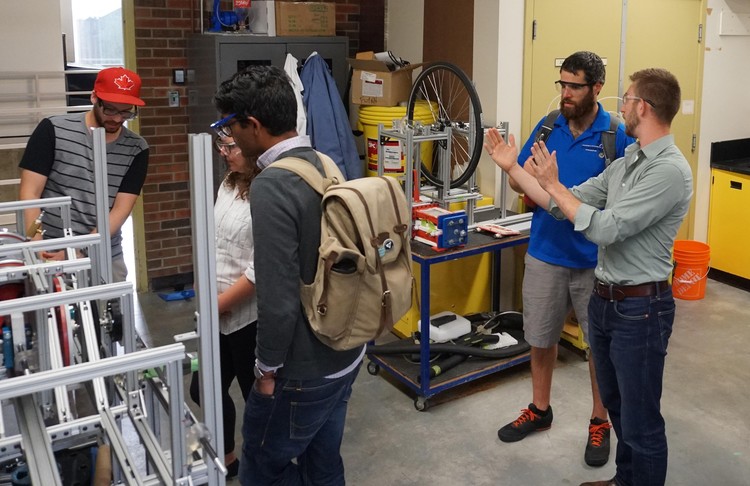Open Doors: Ultra-Low Temperature Stirling Engines for Geothermal Energy
Posted on
Future Energy Systems HQP Jason Michaud and David Miller explaining Stirling engine operation to visitors.
A box of safety glasses was by the door and a gamma-type Stirling engine was running when guests arrived at the second Future Energy Systems Open Doors yesterday. Hosted by Dr. David Nobes and his team in the Dynamic Thermal Energy Conversion Lab (DTECL), the event welcomed more than 20 people from across the University of Alberta community.
Future Energy Systems Investigators like resource economist Dr. Marty Luckert, sociologist Dr. John Parkins, and community planning scientist Dr. Leith Deacon joined HQP from the faculties of Science, ALES and Engineering to learn more about ultra-low temperature differential Stirling engines, which have the potential to open new energy sources to communities across Alberta, and beyond.
All engines operate thanks to a temperature difference –– within a cylinder, one side has a low temperature and the other side has a higher temperature, leading to a difference in pressure that can move a piston and generate power. In most engines, the difference between the hot and cold temperatures needs to be thousands of degrees, but ultra-low temperature differential Stirling engines can turn over with a warm side equal to a cup of coffee, and a cold side just above freezing. This can allow them to harness low-grade geothermal energy, or even waste heat from a variety of commercial or industrial applications.
Working in the DTECL, graduate students Jason Michaud, Calynn Stumpf and David Miller are designing, CADing, manufacturing, testing, and modeling different types of ultra-low temperature differential Stirling engines. You can read more about their work here.
With 75 projects now underway, Future Energy Systems research is being conducted in dozens of labs across the University of Alberta, and with partner institutions like the University of Calgary. Future Open Doors events will continue to cross disciplines and provide opportunities for our researchers, HQP, and members of the public to learn more about cutting-edge energy research.
For alerts about upcoming Open Doors events, and for more Future Energy Systems news, subscribe for updates.